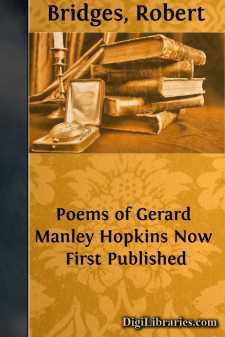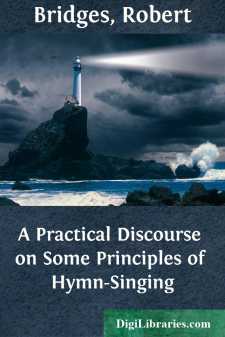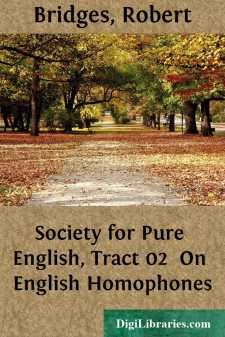Categories
- Antiques & Collectibles 13
- Architecture 36
- Art 48
- Bibles 22
- Biography & Autobiography 813
- Body, Mind & Spirit 142
- Business & Economics 28
- Children's Books 15
- Children's Fiction 12
- Computers 4
- Cooking 94
- Crafts & Hobbies 4
- Drama 346
- Education 46
- Family & Relationships 57
- Fiction 11828
- Games 19
- Gardening 17
- Health & Fitness 34
- History 1377
- House & Home 1
- Humor 147
- Juvenile Fiction 1873
- Juvenile Nonfiction 202
- Language Arts & Disciplines 88
- Law 16
- Literary Collections 686
- Literary Criticism 179
- Mathematics 13
- Medical 41
- Music 40
- Nature 179
- Non-Classifiable 1768
- Performing Arts 7
- Periodicals 1453
- Philosophy 64
- Photography 2
- Poetry 896
- Political Science 203
- Psychology 42
- Reference 154
- Religion 513
- Science 126
- Self-Help 84
- Social Science 81
- Sports & Recreation 34
- Study Aids 3
- Technology & Engineering 59
- Transportation 23
- Travel 463
- True Crime 29
Robert Bridges
Robert Bridges (1844–1930) was an English poet and the British Poet Laureate from 1913 to 1930. His poetry is known for its formal structure and musical quality, often drawing on classical traditions. Some of his notable works include "The Testament of Beauty" and "Shorter Poems," which reflect his deep interest in philosophy, religion, and the beauty of the natural world. Despite his long life and prestigious position, his work remains somewhat overshadowed by the more experimental poets of his era.
Author's Books:
Sort by:
by:
Robert Bridges
OUR generation already is overpast,And thy lov'd legacy, Gerard, hath lainCoy in my home; as once thy heart was fainOf shelter, when God's terror held thee fastIn life's wild wood at Beauty and Sorrow aghast;Thy sainted sense tramme'd in ghostly pain,Thy rare ill-broker'd talent in disdain:Yet love of Christ will win man's love at last. Hell wars without; but, dear, the...
more...
by:
Robert Bridges
What St. Augustin says of the emotion which he felt on hearing the music in the Portian basilica at Milan in the year 386 has always seemed to me a good illustration of the relativity of musical expression; I mean how much more its ethical significance depends on the musical experience of the hearer, than on any special accomplishment or intrinsic development of the art. Knowing of what kind that music...
more...
by:
Robert Bridges
ENGLISH HOMOPHONES Definition of homophone. When two or more words different in origin and signification are pronounced alike, whether they are alike or not in their spelling, they are said to be homophonous, or homophones of each other. Such words if spoken without context are of ambiguous signification. Homophone is strictly a relative term, but it is convenient to use it absolutely, and to call any...
more...




